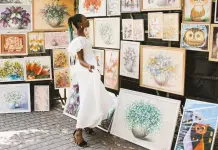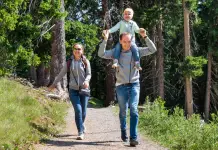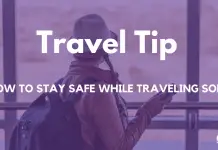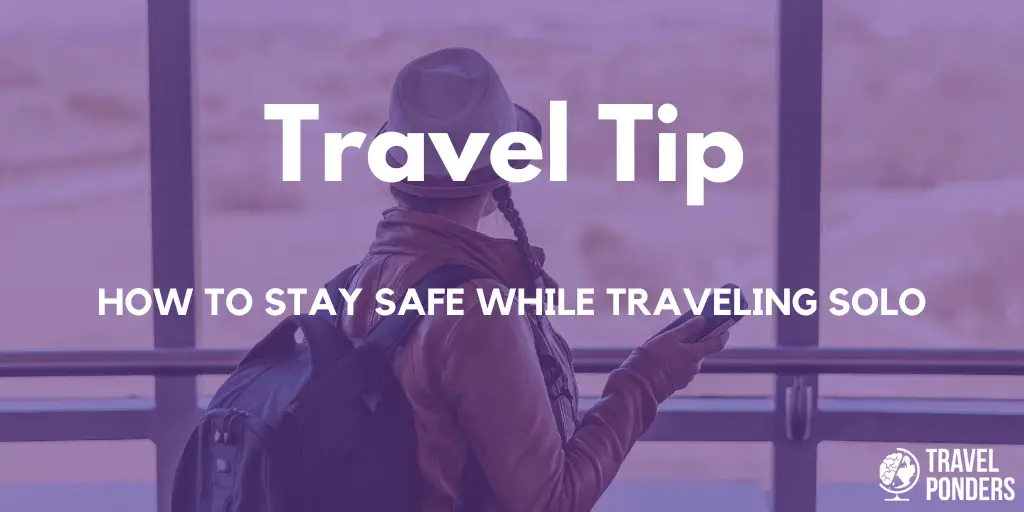You’ve planned the perfect trip and packed everything you need. You’ve got your itinerary written down, copies of important documents are tucked away in your purse or backpack, and you’re ready to go. But wait—aren’t there some other things you should do before leaving on that solo adventure?
Of course. Traveling safely means being vigilant about your surroundings at all times and staying alert to what’s happening around you while still enjoying yourself. It also means giving some thought to how best to stay safe when traveling alone so that any potential issues can be dealt with before they become emergencies.
Tell someone back home your itinerary.
When you travel alone, it’s important to stay connected with the people back home. Tell a friend or family member where you’re going and when you plan to return. Give them a copy of your itinerary so they can see exactly how long it will take you to get from Point A to Point B.
They’ll know when something is wrong if they don’t hear from you in the expected timeframe. If possible, give them a few different ways for them to reach out—phone number (if texting isn’t an option), email address, social media account, etc.—so that even if one method fails, another will work just fine!
Keep copies of important documents with you.
While traveling, you may lose your passport or other identification documents. Having a copy of these documents in your possession can help make it easier to prove who you are and secure replacements.
Keep copies of your passport, driver’s license, credit cards, and flight information in a separate location from your actual documents. You should also keep copies on you at all times so that if something happens to them (such as being lost), you have backup documentation readily available.
Don’t wear flashy or expensive jewelry.
You don’t need to be a savvy traveler to know that there are certain rules of the road when it comes to staying safe. So what should you do if you’re traveling solo?
While some might suggest that you should carry a weapon or wear your life jacket at all times, I believe there are better ways to keep yourself safe while traveling alone. The easiest way is by simply not wearing flashy or expensive jewelry.
You don’t want someone walking up behind you on the street and grabbing your necklace off your neck without permission because they think it looks cool. You also don’t want someone breaking into your hotel room and stealing everything from inside—including those earrings with diamonds around them which cost more than my laptop did when I bought it three years ago (which means nothing).
Don’t tell people where you’re staying.
Don’t tell people where you’re going or how long for, unless it’s an emergency like a death in the family or something equally important that has to be handled immediately and urgently, because otherwise, this can become a problem later on if someone finds out where you’ve been staying and wants to go there too, then what?
Then they’ll know all about it too which isn’t great because now there are two of us who know things that we oughtn’t to be told so if they were ever found out by someone else who didn’t want them knowing those same things…*shrugs*.
Invest in a cheap, prepaid phone.
Prepaid phones are a great way to stay in touch with loved ones and get help if you need it. They’re inexpensive, which means you can buy one for every country you visit. You can also use them to get directions or make reservations at restaurants in foreign cities. Most importantly, if something goes wrong or someone threatens your safety (which is why I always carry pepper spray), you can call the police from anywhere.
Carry only as much cash as you need each day.
You should only carry as much cash as you need for the day. For instance, if you’re traveling to a big city, there are plenty of ATMs and other ways to exchange currency. This way, if someone does steal your money or mug you, it won’t be as huge of an issue because you didn’t have all your valuables in one place.
Keep a backup credit card and at least one extra debit card in your luggage.
If you’re traveling alone, it’s important to have a backup credit card and at least one extra debit card in your luggage. (I recommend keeping both on you at all times.)
The reason you want a backup credit card is that if anything happens to your main credit card while traveling, such as theft or loss of the physical card itself, that second credit card will be able to help you out until you can get home and sort things out with customer service.
The reason why I recommend keeping an extra debit card in your luggage is that sometimes ATMs can be weird with certain types of cards—the only way around that is using cash instead. Many people don’t realize this until they’re on the other side of the world trying to withdraw their funds from an ATM and having their bank tell them “Sorry! Your bank won’t let me give you money!”
And then what do they do? They panic! But no need for that anymore: just remember to pack one extra debit/ATM-friendly prepaid Visa/Mastercard in case something like this happens again!
Use traveler’s checks and convert them to cash when necessary.
Traveler’s checks are a good option if you’re traveling solo and have plans to take part in activities that involve carrying more cash than usual. With traveler’s checks, you can be sure that the money is safe and secure. These types of checks can be replaced if they are lost or stolen, which is something not everyone who uses cash will have access to if they’re robbed on their travels.
There are different ways to convert traveler’s checks into cash as well: You could visit your bank or credit union (if they offer this service), but some banks don’t allow ATM withdrawals with foreign currency. In this case, it might be better for you to wait until arriving at a place where there are ATMs that offer U.S.-dollar withdrawals—for example, an airport or large city with many tourists—so that it’s easier for you to exchange them back into dollars when needed.
Traveler’s checks can also be replaced immediately if lost or stolen by contacting the issuer directly through email or phone call; however sometimes this takes several days depending on how busy the company is so it’s best not travel with more than one type just in case something happens along the way!
Avoid carrying a purse if possible, but if you must go out with one, carry it over your shoulder and against your body so it can’t be easily snatched by thieves on motorcycles or bicycles.
If you must carry a purse, wear it across your body and against your body. Don’t carry bags with straps that can easily be cut, including travel backpacks.
If you have to use a shoulder bag with a strap, make sure the strap is tight so that it isn’t hanging loosely around your neck or over one shoulder.
Be careful in crowded areas like markets and train stations.
Whether you’re in a crowded market or train station, be careful of your belongings. Thieves and pickpockets often work in these areas because they know that people are distracted by other things. Thieves on motorcycles or bicycles often target tourists who are carrying large backpacks, so keep your eyes on the road and be sure not to walk with headphones in so you can hear if someone’s trying to grab them from behind.
If someone approaches you asking for money, refuse politely but firmly—often times these people are scammers who only want the chance to take advantage of your kindness.
Trust your instincts. If something doesn’t feel right, make a detour.
Trust your instincts. If something doesn’t feel right, make a detour. If you aren’t comfortable with the situation, leave. If you’re in trouble and need help, ask for it—and don’t be afraid to call the police if necessary.
If there’s one thing to remember about safety while traveling solo, it’s this: if something doesn’t feel right, trust yourself enough to ask questions or get out of harm’s way immediately.
Traveling safely depends on being cautious and following basic security measures
Your safety while traveling depends on your awareness of your surroundings, the precautions you take, and how comfortable you feel asking for help when needed.
First and foremost, being aware of your surroundings is one of the best ways to stay safe. Whether you’re traveling solo or with a group, it’s important to always know where you are and who is around at all times. Be sure to look both ways before crossing any street or walking into an alleyway – even if there doesn’t seem like anyone around! It’s also important not to walk alone at night or in unknown areas (which is often referred to as “traveling smart”). In addition, be wary about accepting rides from strangers—even if they offer them! They could be criminals looking for victims who do not have any friends nearby as a way of making it easier for them get away once they commit their crimes against us.”
Conclusion
Staying safe while traveling doesn’t have to be difficult. By following the tips in this article, you’ll be able to keep yourself out of harm’s way no matter where you go! Just remember that caution is key, and if something doesn’t feel right, don’t do it.
Author Bio: Kyle Kroeger is the owner of ViaTraveler.com. ViaTravelers is a destination travel blog providing the best tips, hacks, and itineraries to help you explore the world. Follow us on Instagram, Pinterest, and YouTube.



















